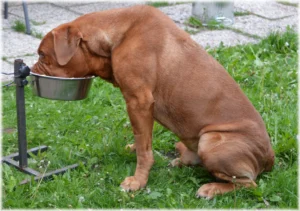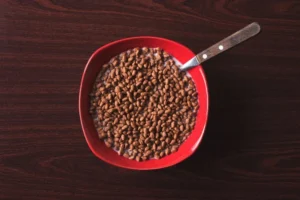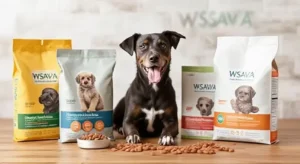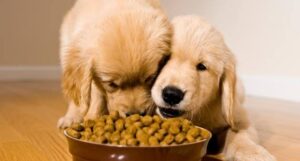Dog Food

Dog Food:- Our dogs are beloved members of our family, and it’s natural to want to share with them the things we enjoy—sometimes, that includes our favorite foods. However, when it comes to feeding human food to dogs, it’s essential to understand that dogs and humans metabolize food differently.
Some human foods are safe and beneficial for dogs, while others can be harmful or even deadly. Let’s explore which human foods are good for dogs, which should be avoided, and how to ensure you’re making safe, nutritious choices for your furry friend.

Safe Human Foods for Dogs
Many human foods can be good for dogs if prepared properly and given in moderation. Here’s a list of healthy human foods that can be a part of your dog’s diet:
Proteins
Dogs thrive on high-quality proteins, just like their wild ancestors. Here are some dog-safe protein sources:
• Chicken: Cooked chicken is a great source of lean protein, healthy fats, and vitamins. Be sure to avoid fatty skin and any seasonings that could upset your dog’s stomach.
• Beef: Beef is a complete protein loaded with essential nutrients like iron, zinc, and vitamins B12 and B6. Cooked, lean beef is best.
• Turkey: Turkey is another lean protein that’s safe for dogs, as long as it’s served without the skin or fatty trimmings, which can lead to digestive issues.
• Lamb: Lamb provides high-quality protein, iron, and zinc. As with other meats, it should be cooked to prevent the risk of foodborne illness.
• Cooked Fish: Fish like salmon and cod are great sources of protein and essential fatty acids, which help maintain a healthy coat and skin. Be sure to cook the fish to avoid harmful parasites and toxins.
• Peanut Butter: Unsalted, all-natural peanut butter is safe for dogs in small amounts. It’s important to check the label to ensure there are no added sugars, sweeteners like xylitol (which is toxic to dogs), or excessive salt.
Vegetables
Adding vegetables to your dog’s diet can provide a host of vitamins and minerals. Some of the best veggies for dogs include:

• Carrots: Carrots are packed with beta-carotene, which supports eye health, as well as antioxidants. They make a great low-calorie snack for dogs.
• Sweet Potatoes: Sweet potatoes are full of fiber, vitamins A and C, and antioxidants. Be sure to cook them to make them easier to digest.
• Broccoli: This cruciferous vegetable is loaded with vitamins K, C, and A, as well as fiber and antioxidants. Feed broccoli in moderation, as too much can irritate your dog’s digestive system.
• Green Beans: Green beans are low in calories but high in vitamins, minerals, and fiber, making them an excellent snack for dogs.
Foods to Avoid
While some human foods are safe for dogs, others are highly toxic and should be avoided entirely. Here’s a list of foods to keep out of your dog’s diet:
• Chocolate: Chocolate contains theobromine, which is toxic to dogs and can cause vomiting, diarrhea, seizures, and even death.
• Grapes and Raisins: These fruits can cause kidney failure in dogs, even in small amounts.
• Onions and Garlic: These ingredients can damage your dog’s red blood cells and lead to anemia.
• Avocados: Avocados contain persin, which can cause vomiting and diarrhea in dogs.
• Alcohol: Even small amounts of alcohol can be dangerous for dogs, leading to vomiting, diarrhea, and in severe cases, coma or death.
Packed Fresh Food for Dogs: A Trending Solution
With the increasing awareness of dog nutrition, packed fresh food for dogs has gained popularity. This is dog food made from high-quality, human-grade ingredients and packaged to remain fresh for extended periods without the need for cooking.
Is Packed Fresh Food Safe for Dogs?
Yes, packed fresh food can be a safe, nutritious option for dogs, provided it’s from a reputable brand. It’s important to choose dog food made from whole ingredients without fillers, preservatives, or by-products. Look for food where you can visibly see the ingredients, as overly processed dog food can hide poor-quality ingredients. Fresh food options that prioritize transparency about their ingredient sourcing and processing practices are ideal.
Raw Food Diet for Dogs: Pros and Cons
The raw food diet has become increasingly popular among dog owners, who believe it mirrors a dog’s ancestral diet. A typical raw diet consists of raw muscle meat, organ meat, and bones, as well as fruits and vegetables.
Why Is Raw Food Good for Dogs?
Supporters of raw diets argue that raw food is closer to what dogs would eat in the wild and provides all the nutrients they need without unnecessary fillers. Raw diets are often seen as more digestible and less likely to cause food allergies.

However, it’s important to note that raw food diets come with risks, particularly the potential for contamination from bacteria such as salmonella and E. coli. Ensuring food safety through proper handling, preparation, and sourcing is crucial for owners who opt to feed their dogs raw.
Balancing Nutrition for Your Dog
While many human foods are safe for dogs, it’s important to feed them in moderation. Too much of even a healthy food can lead to weight gain or upset stomachs in dogs. For example, while peanut butter and sweet potatoes are healthy in small amounts, overfeeding these high-calorie treats can contribute to obesity. Portion control is key.
The Role of Carbohydrates
Unlike humans, dogs don’t have a biological need for carbohydrates. While they have evolved to digest some carbs, they don’t require them in large amounts. This is why heavily processed kibble, often high in carbohydrates, isn’t the healthiest choice for dogs. A balanced diet rich in proteins and healthy fats, with moderate carbs from fruits and vegetables, is best for maintaining your dog’s overall health.
Conclusion
When it comes to feeding your dog human food, knowledge is power. Many human foods can be safe and nutritious for dogs, but others can be harmful or even fatal. Always research or consult your veterinarian before introducing new foods to your dog’s diet. Whether you choose to feed your dog home-prepared meals, packed fresh food, or raw diets, ensuring that their nutrition is balanced and safe is the best way to keep your furry friend happy and healthy.
Also Read:-




